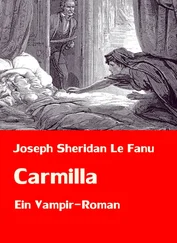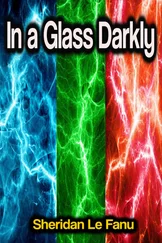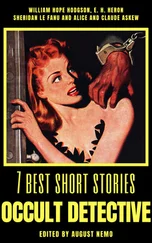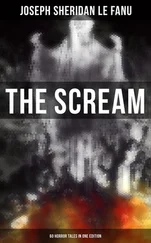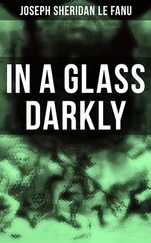“Hey? that’s very curious, egad! I daresay,” said the Doctor, set right thus by the stranger, and eyeing him curiously.
“Very true, sir,” observed Mr. Peers; “three of those oaks, though, two of them little better than stumps, are there still; and Clewson of Heckleston has an old document ——”
Here, unhappily, the landlord entered the room in a fuss, and walking up to the stranger, said, “The chaise is at the door, Mr. Feltram, and the trunks up, sir.”
Mr. Feltram rose quietly and took out his purse, and said,
“I suppose I had better pay at the bar?”
“As you like best, sir,” said Richard Turnbull.
Mr. Feltram bowed all round to the gentlemen, who smiled, ducked or waved their hands; and the Doctor fussily followed him to the hall-door, and welcomed him back to Golden Friars — there was real kindness in this welcome — and proffered his broad brown hand, which Mr. Feltram took; and then he plunged into his chaise, and the door being shut, away he glided, chaise, horses, and driver, like shadows, by the margin of the moonlighted lake, towards Mardykes Hall.
And after a few minutes’ stand upon the steps, looking along the shadowy track of the chaise, they returned to the glow of the room, in which a pleasant perfume of punch still prevailed; and beside Mr. Philip Feltram’s deserted tea-things, the host of the George enlightened his guests by communicating freely the little he had picked up. The principal fact he had to tell was, that Sir Bale adhered strictly to his original plan, and was to arrive on the tenth. A few days would bring them to that, and the nine-days wonder run its course and lose its interest. But in the meantime, all Golden Friars was anxious to see what Sir Bale Mardykes was like.
Chapter 4. The Baronet Appears
As the candles burn blue and the air smells of brimstone at the approach of the Evil One, so, in the quiet and healthy air of Golden Friars, a depressing and agitating influence announced the coming of the long-absent Baronet.
From abroad, no good whatever had been at any time heard of him, and a great deal that was, in the ears of simple folk living in that unsophisticated part of the world, vaguely awful.
Stories that travel so far, however, lose something of their authority, as well as definiteness, on the way; there was always room for charity to suggest a mistake or exaggeration; and if good men turned up their hands and eyes after a new story, and ladies of experience, who knew mankind, held their heads high and looked grim and mysterious at mention of his name, nevertheless an interval of silence softened matters a little, and the sulphureous perfume dissipated itself in time.
Now that Sir Bale Mardykes had arrived at the Hall, there were hurried consultations held in many households. And though he was tried and sentenced by drum-head over some austere hearths, as a rule the law of gravitation prevailed, and the greater house drew the lesser about it, and county people within the visiting radius paid their respects at the Hall.
The Reverend Martin Bedel, the then vicar of Golden Friars, a stout short man, with a mulberry-coloured face and small gray eyes, and taciturn habits, called and entered the drawing-room at Mardykes Hall, with his fat and garrulous wife on his arm.
The drawing-room has a great projecting Tudor window looking out on the lake, with its magnificent background of furrowed and purple mountains.
Sir Bale was not there, and Mrs. Bedel examined the pictures, and ornaments, and the books, making such remarks as she saw fit; and then she looked out of the window, and admired the prospect. She wished to stand well with the Baronet, and was in a mood to praise everything.
You may suppose she was curious to see him, having heard for years such strange tales of his doings.
She expected the hero of a brilliant and wicked romance; and listened for the step of the truant Lovelace who was to fulfil her idea of manly beauty and fascination.
She sustained a slight shock when he did appear.
Sir Bale Mardykes was, as she might easily have remembered, a middle-aged man — and he looked it. He was not even an imposing-looking man for his time of life: he was of about the middle height, slightly made, and dark featured. She had expected something of the gaiety and animation of Versailles, and an evident cultivation of the art of pleasing. What she did see was a remarkable gravity, not to say gloom, of countenance — the only feature of which that struck her being a pair of large dark-gray eyes, that were cold and earnest. His manners had the ease of perfect confidence; and his talk and air were those of a person who might have known how to please, if it were worth the trouble, but who did not care twopence whether he pleased or not.
He made them each a bow, courtly enough, but there was no smile — not even an affectation of cordiality. Sir Bale, however, was chatty, and did not seem to care much what he said, or what people thought of him; and there was a suspicion of sarcasm in what he said that the rustic literality of good Mrs. Bedel did not always detect.
“I believe I have not a clergyman but you , sir, within any reasonable distance?”
“Golden Friars is the nearest,” said Mrs. Bedel, answering, as was her pleasure on all practicable occasions, for her husband. “And southwards, the nearest is Wyllarden — and by a bird’s flight that is thirteen miles and a half, and by the road more than nineteen — twenty, I may say, by the road. Ha, ha, ha! it is a long way to look for a clergyman.”
“Twenty miles of road to carry you thirteen miles across, hey? The road-makers lead you a pretty dance here; those gentlemen know how to make money, and like to show people the scenery from a variety of points. No one likes a straight road but the man who pays for it, or who, when he travels, is brute enough to wish to get to his journey’s end.”
“That is so true, Sir Bale; one never cares if one is not in a hurry. That’s what Martin thinks — don’t we, Martin? — And then, you know, coming home is the time you are in a hurry — when you are thinking of your cup of tea and the children; and then , you know, you have the fall of the ground all in your favour.”
“It’s well to have anything in your favour in this place. And so there are children?”
“A good many,” said Mrs. Bedel, with a proud and mysterious smile, and a nod; “you wouldn’t guess how many.”
“Not I; I only wonder you did not bring them all.”
“That’s very good-natured of you, Sir Bale, but all could not come at one bout; there are — tell him, Martin — ha, ha, ha! there are eleven.”
“It must be very cheerful down at the vicarage,” said Sir Bale graciously; and turning to the vicar he added, “But how unequally blessings are divided! You have eleven, and I not one — that I’m aware of.”
“And then, in that direction straight before you, you have the lake, and then the fells; and five miles from the foot of the mountain at the other side, before you reach Fottrell — and that is twenty-five miles by the road ——”
“Dear me! how far apart they are set! My gardener told me this morning that asparagus grows very thinly in this part of the world. How thinly clergymen grow also down here — in one sense,” he added politely, for the vicar was stout.
“We were looking out of the window — we amused ourselves that way before you came — and your view is certainly the very best anywhere round this side; your view of the lake and the fells — what mountains they are, Sir Bale!”
“‘Pon my soul, they are! I wish I could blow them asunder with a charge of duck-shot, and I shouldn’t be stifled by them long. But I suppose, as we can’t get rid of them, the next best thing is to admire them. We are pretty well married to them, and there is no use in quarrelling.”
Читать дальше


